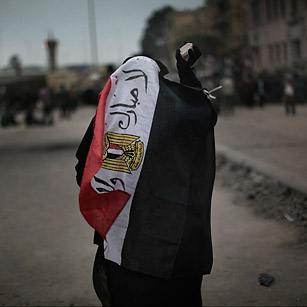
A veiled Egyptian woman, with her national flag reading in Arabic "No to Mubarak" attached to her back, walks with a stone towards makeshift barricades after rumours spread that the army was abandoning positions at Tahrir Square in Cairo on February 5, 2011.
The middle-aged female anchor with the short brown bob cut turned to the studio guest seated to her right, a retired major general in a gray suit, as a rolling, royal blue map of the world scrolled in the background. "You know, these young people mock us when older, wiser people tell them that there is a foreign plot against Egypt, that what is happening is not the work of Egyptians," she says.
"It's a problem with the media," the former military man replies. "There are some satellite channels — and we all know who they are — that unfortunately are trying to damage Egypt's interests," a clear reference to the Arabic channels Al-Arabiya and Al-Jazeera.
"So how are we supposed to get this idea to the protesters in Tahrir?," the state TV anchorwoman says earnestly, mentioning the square in central Cairo that has become the focal point of anti-government protests, now in their 12th day.
It's a question repeated throughout the night on Nile Television, as well as on another state television broadcaster, Akhbar Egypt, which has been running an image of the Egyptian flag in its top left-hand corner emblazoned with the phrase "Protect Egypt."
Egypt's many state channels initially played down the anti-government protests in the first days, but later gave them rolling coverage, albeit with a clear pro-government bias, as evidenced from the questioning, the choice of guests and footage.
The top story on last night's Nile TV news broadcast, for example, was the protest in Tahrir Square. "Tens of thousands of Egyptians demonstrated in Tahrir Square today, responding to the call for change and reform in their country," the anchorman said. While crowd estimates are always difficult to accurately ascertain, most of the foreign media, both print and television, agreed that there were hundreds of thousands in the square on Friday.
The Nile TV broadcast made no mention of the fact that many of the same protesters were demanding the immediate ouster of longtime President Hosni Mubarak, nor did it broadcast any of the many unflattering posters, banners or slogans against the president. "There were many foreigners among the protesters," the voiceover continued, before adding that Arab League Secretary General Amr Moussa toured the square and "asked the protesters to return home because the authorities had received their message of reform." Moussa was in fact in the square on Friday, but did not address the crowd, according to several news sources, because he was drowned out by cheers from protesters who view him as a potential presidential candidate.
To watch Egyptian state television news is to come away with the idea that foreigners, especially the foreign media, are instigating Egypt's current political crisis and that the agenda of the young people who first demonstrated on January 25th, the first day of protests, has been hijacked by the still-proscribed Muslim Brotherhood and foreign interests.
"Dear viewers we want to bring you this footage obtained by a patriotic Egyptian in Tahrir Square," Akbar Egypt says, presenting the shaky image of a middle-aged blonde woman with long droopy earrings and a young bearded Western man with a keffiyeh around his neck holding up an English banner that reads "In solidarity with the Egyptian people."
"It's clear, dear viewers, that there are many foreigners protesting down in Tahrir. These are the people in the square," the presenter continues.
Nile TV meanwhile, has split its screen in two. On the left, a very wide shot taken from a great distance of the outskirts of Tahrir Square. Half of the image is blocked by the deep salmon building of the National Museum. It's difficult to make out individuals who just appear as faint blurs. There are banners, but it's impossible to read them. The right half of the screen is a tight shot of flag-waving, dancing pro-Mubarak supporters in the Cairo suburb of Mohandiseen. It looks like there are hundreds of people having a great time.
The anchorwoman with the bob cut is listening to a correspondent report over the phone from Tahrir Square.